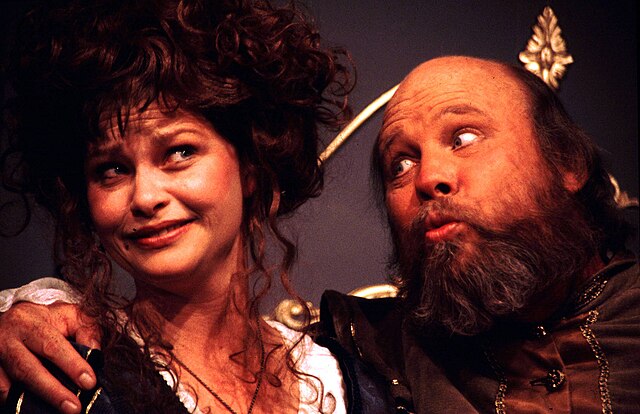Sir John Falstaff is a fictional character who appears in three plays by William Shakespeare and is eulogised in a fourth. His significance as a fully developed character is primarily formed in the plays Henry IV, Part 1 and Part 2, where he is a companion to Prince Hal, the future King Henry V of England. Falstaff is also featured as the buffoonish suitor of two married women in The Merry Wives of Windsor. Though primarily a comic figure, Falstaff embodies a depth common to Shakespeare's major characters. A fat, vain, and boastful knight, he spends most of his time drinking at the Boar's Head Inn with petty criminals, living on stolen or borrowed money. Falstaff leads the apparently wayward Prince Hal into trouble, and is ultimately repudiated after Hal becomes king.
Adolf Schrödter: Falstaff and his page
Mistress Page and Falstaff in The Merry Wives of Windsor, staged by Pacific Repertory Theatre in 1999
1829 watercolor by Johann Heinrich Ramberg of Act II, Scene iv: Falstaff enacts the part of the king
Falstaff with Doll Tearsheet in the Boar's Head tavern, illustration to Act 2, Scene 4 of the play by Eduard von Grützner
William Shakespeare was an English playwright, poet, and actor. He is widely regarded as the greatest writer in the English language and the world's pre-eminent dramatist. He is often called England's national poet and the "Bard of Avon". His extant works, including collaborations, consist of some 39 plays, 154 sonnets, three long narrative poems, and a few other verses, some of uncertain authorship. His plays have been translated into every major living language and are performed more often than those of any other playwright. Shakespeare remains arguably the most influential writer in the English language, and his works continue to be studied and reinterpreted.
The Chandos portrait, likely Shakespeare, early 17th century
John Shakespeare's house, believed to be Shakespeare's birthplace, in Stratford-upon-Avon
Shakespeare's coat of arms, from the 1602 book The book of coates and creasts. Promptuarium armorum. It features spears as a pun on the family name.
Shakespeare's funerary monument in Stratford-upon-Avon








